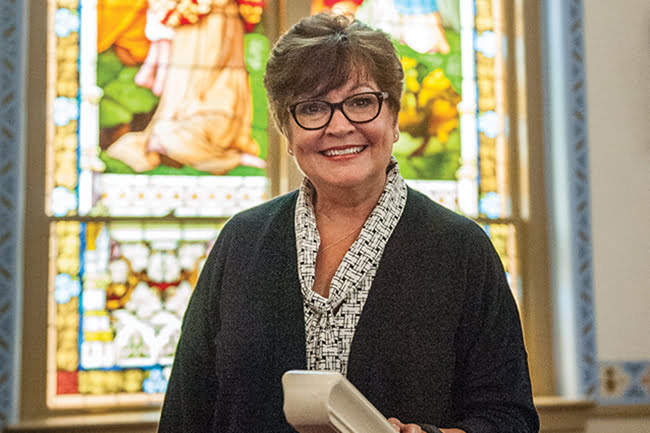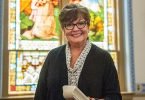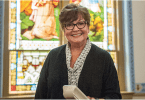
by Lesle Knop
In good times, I am guilty of taking for granted our freedom to gather for celebrations of the sacraments, to worship and share the joy of the liturgical seasons, and to partake regularly in the holy Eucharist.
Years ago, when my husband and I began sharing in the role of sacristan for a few weekend Masses every month, we were given instructions for the rare occasion when a priest is not available to celebrate Mass.
That hasn’t happened yet. We could set our clocks by Father Pete (O’Sullivan).
We forget that the church is built from living stones. Before any government mandates were issued in Kansas in response to COVID-19, Kansas bishops acted decisively to ensure that public safety measures were in place to prevent the spread of a dangerous virus.
Pastors closed their churches, increased online opportunities for prayer and worship, and comforted our people with technological outreach we have never experienced before.
Although saddened by the limitations that have been imposed, I understand their necessity.
In our isolation, our “domestic church” thrives. My husband and I talk more, pray more and more frequently examine our consciences with apologies and expressions of gratitude.
With livestreaming of Sunday and daily Mass, weeknight rosaries and Holy Hours, meditations and webinars offered by countless parishes and ministries, our little home “altar” has been a busy place.
None of us will be able to avoid carrying our crosses on the “Via Dolorosa” of life. The pandemic has led to tragic deaths of many loved ones, heroic sacrifices by our health care and public safety providers, and loss of income for millions of unemployed.
While many endure never-ending injustice in their lives, our temporary sacrifices and frustrations as Catholics during this historic pandemic are comparatively easy to “offer up.”
Throughout history, people professed their Catholic faith while seldom being able to receive the sacraments, reminding me once again that “building the church” is what Christian stewards do every day as our “disciples’ response” for all that God has given us.
We hear, “The Lord be with you,” and gratefully respond, “And with your spirit.”
Buried in a cemetery in southeast Kansas are the remains of my great-great-grandparents.
On Vacslav’s tombstone are the Latin words “Dominus Vobiscum” and on Ludmilla’s is the Latin response: “Et Cum Spiritu Tuo.”
Their testament was etched on their graves — and in the hearts of succeeding generations.
When settlers like my ancestors emigrated from their homes in other countries to Kansas, the church buildings we now take for granted had not yet been built.
This historic experience of the COVID-19 epidemic is a gut-wrenching reminder that there are places in this world where Catholics face immense persecution.
Let’s never forget to be grateful for our religious freedom.



